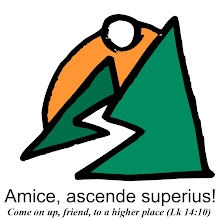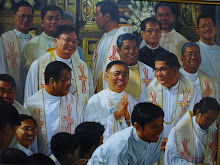An Experience of God through Lectio Divina
Thus says the LORD: Cursed is the man who trusts in human beings, who seeks his strength in flesh, whose heart turns away from the LORD. He is like a barren bush in the desert that enjoys no change of season, But stands in a lava waste, a salt and empty earth. Blessed is the man who trusts in the LORD, whose hope is the LORD. He is like a tree planted beside the waters that stretches out its roots to the stream: It fears not the heat when it comes, its leaves stay green; In the year of drought it shows no distress, but still bears fruit.( Jeremiah 17:5-8)
Heart and Mind in Tandem
Lectio Divina suits my personality fine. I can bask under the warm glow of feelings for as long as I want. I can also bathe in the refreshing waters of novel insights born of a more mind-based reflection. There is abundance of the heart and free-flowing cooperation of the mind in this ancient process-prayer that puts the heart and mind in a dynamic mode of cooperation. As a basically heart person, trained, for the most part, to be a thinker, lectio divina is an experience that brings me more in touch with my strong feeling component.
A passage from Jeremiah quoted above, part of the responsory in the Office of Readings for one of the last weeks of ordinary time is what I base this reflection on.
Nature as Nurturing Mother
I love nature. I can spend hours gazing at a stream, and lolling on the grassy embankment. I am spiritually energized every time I go up mountains and trek by gorges and heights. In the countless foot journeys up mountains I have done in life, passing by refreshing rivers, gurgling and glinting under the sun, after a long, dry spell of seemingly endless, thirst-inducing trek, has always been a welcome treat. It has always led me to think about God as present in nature, a God who cares for weary trekkers like us, who could use a refreshing, reinvigorating time with mother nature.
Jeremiah’s image of a tree planted beside water is one that I found myself very much at home with, for actual and existential reasons.
Falling Leaves, Faltering Hopes
It is nearing autumn once again (even if I live in the torrid tropics!). Four years ago, when I was deep in further studies in Baltimore, Maryland, me and my siblings, along with a great many relatives and friends, buried an older sister, the second in our large family, taken away at a relatively young age at 56, by a cruel and unforgiving disease called cancer.
Not long after that, it was once more “autumn” in my life. Just when I thought we were just getting started on our downhill trek towards recovery, the shattering news came that another sister, younger this time, has a similar cancer … and then another, still more recently … third in a row!
To shift metaphors, I am once more on the uphill climb, up towards a barren, dry, and hot, lava-seared landscape that reminded me of a mountain I climbed 19 years ago. I am once more struggling and groveling up the lava waste of an experience that saps away hope, that dries up tender saplings of trust in God-nurturing-mother who seems to have walked out on us, on me, once again.
My sisters’ and the rest of my surviving siblings’ own “Goldengrove,” in allusion to Manley-Hopkins’ poignant poem addressed to the young Margaret, “grieving,” is now once more “unleaving.” The falling leaves speak not only of both actual and potential losses. They speak to me of unwanted endings. They remind me of “hope growing grey hairs,” of what the same Jesuit poet refers to as an experience in which “all I endeavor in disappointment end.”
What No Mind, Nor Thought Can Express
The prayer experience proved to be, as usual, an oasis for my thirsty soul. “As runs the thirsting deer to find where cooling waters flow, so rush the wishes of my heart to come before you Lord,” was a refrain of an old, old song back in seminary days that I kept on repeating. Jeremiah’s prophetic utterance could not have come at a better time. I dwelt on it. I mulled over it for a long while. I allowed images of me actually peering over the crater of a hot, smoking volcano (something I actually did in that climb 19 years ago), and then running down for dear life to the safety and refreshing coolness of regurgitating waters further down refreshing me. “What no mind, no, nor heart expressed, ghost guessed” … the possibility that I could actually be not that kind of tree Jeremiah may be speaking of.
Searing Pain, Healing Word
The rhythm of the prayer, with its four stages, that allowed me to rock back and forth lectio, meditatio, oratio, and contemplatio, brought up to me images of a nurturing mother lulling her child to safety and warmth. The pain I felt was real and deeply searing. But the prayer experience, based on the Word, came out as a healing experience. More than that, it offered me reassurance. And even more than that, it gave fresh insights. Hope falters when love’s conviction alters. When one is far from the life-giving waters; when one is not rightly planted near where grace flows, hope shrivels at the root.
Searching and Finding
I have always wondered at the internalized object I have been associating with God all this time. I have always wondered how best for me to think of God and how best to relate to this internalized object-image I learned from when I was a child. My search did not go in vain, at least as far as this prayer experience is concerned. The experience convinced me, more than ever, that my internalized object-image of God has always been that of a parent, a caring, nurturing mother, to be exact. Although thinking of God as father was not entirely distasteful to me, I realized I could “taste and see the goodness of God” more if I imagined Him as a provident parent. No wonder I always found it easier to commune with Him in and through nature. No wonder images of deer running to the water always strike me. No wonder, too, that Francis Thompson’s poems delight me, particularly his “God and the Child,” and “The Hound of Heaven.”
Fearing No the Heat When It Comes
I am afraid of the worst for my two other siblings just as I had been eight years ago. I am afraid of so many things, including what the future has in store for me and the rest of what used to be a big family. The realization that our genetic make-up is not that resilient to disease comes to me as one “long dry spell of searing heat,” placing me in a situation where I can “enjoy no change of season,” as Jeremiah wrote.
But it is precisely at times like these that prayer becomes more meaningful. It is only when one’s faith is sorely tested, when one’s love is forcibly “altered” by both pleasant and unpleasant circumstances, that one’s hope shines. Earth is, indeed, “crammed with heaven, and every bush is afire with God,” as Elizabeth Barrett-Browning so nicely puts it. But “only he who sees takes off his shoes and worships.” Only he who sees far beyond … Only he who sees can understand the meaning behind things and events, including a bush – nothing more and nothing else, but a manifestation of God.
I still do not understand the “heat” that has once too often come into my life. But prayer at least helps me to accept what is unfathomable and what is unacceptable. It, at least, helps me gain back precious perspective. Most importantly, it shows me who I basically am, someone who may need to draw closer to the stream, someone who may need to remain planted beside the waters, if I want to be, and remain a tree that “fears not when the heat comes, and whose leaves stay green.”

